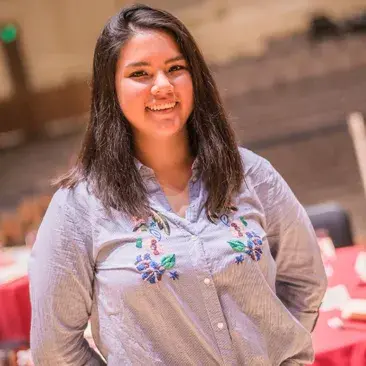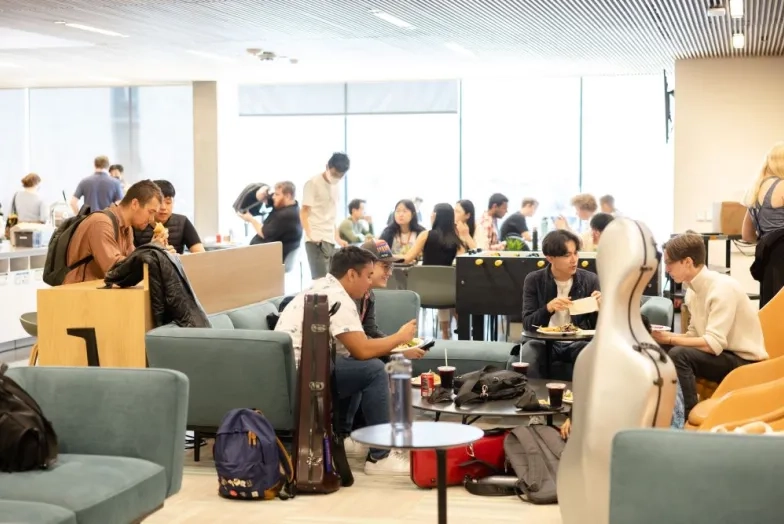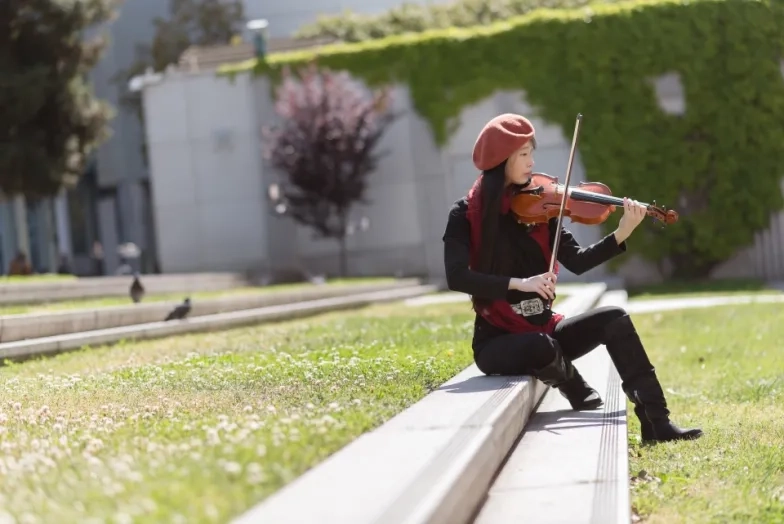Applying for Aid
Collegiate Apply / Request Information
We are here to help our talented students and their families manage the cost of world-class music education through a wide variety of sources, including SFCM scholarships, federal and state grants, loans, and job opportunities. The recipient may accept all or any part of the aid offered, and may also sign up for our Term Payment Plan.
In addition, many students get financial help from outside sources such as state scholarships and local music organizations.
USA Citizens and Permanent Residents
FAFSA
The FAFSA will be available Sunday, October 1, 2025 for the 2025 - 2026 school year. Students, who are United States citizens or permanent residents, applying for any scholarship and/or other financial aid are required to complete the Free Application for Federal Student Aid (FAFSA) by February 15. This can be found at www.studentaid.gov. Federal aid includes Pell Grants, Supplemental Educational Opportunity Grants (SEOG), Direct Loans, both subsidized and unsubsidized, and Work Study. Our federal school code for the FAFSA is 001278. Please make sure your 2025-26 FAFSA information is correct. The most efficient way to do so is to use the FAFSA's Direct Data Share Tool, which imports data directly from your IRS records.
International Students
International students applying for scholarship and/or other financial aid are required to complete the CSS Profile (school code: 4744) by February 15.
Once you have accepted admission, in order for the Conservatory to issue an I-20 form you will be required to show proof of sufficient funds to pay for any tuition not covered by scholarship assistance, as well as for all of your living costs, travel expenses, and the SFCM student health insurance plan (total budget minus any awarded scholarship). Proof of sufficient funds includes original bank statements. If the statements are not in the student's name, a completed Affidavit of Support is required.
International students will not be considered for scholarship until all required financial documents have been submitted.
Curious about Financial Aid? Here are our most asked questions:
SFCM’s Director of Financial Empowerment and Access Kellie Gaines, M.Ed, answers the most frequently asked questions about financial aid and the Free Application for Federal Student Aid (FAFSA).
College is a substantial investment. SFCM's Office of Financial Aid is dedicated to helping students and their families understand and manage the cost of a world-class music education.
Aid is available from a wide variety of sources, including the newly announced Founders Scholarships that range from $20,000 to full tuition for students of exceptional potential. Ninety-nine percent of SFCM students are awarded scholarship assistance, and the average amount covers about 57% of tuition.
As prospective students consider their next steps, SFCM Director of Financial Empowerment and Access, Kellie Gaines provides guidance about the most frequently asked questions about affording the Conservatory experience:
Financial aid includes all types of financial help for your studies. Scholarships, loans, work study, and grants are all considered types of financial aid.
The Free Application for Federal Student Aid (FAFSA) is the form you need to fill out to get any financial aid from the federal government to help pay for college. Each year, over 13 million students who file the FAFSA get more than $120 billion in grants, work-study, and low-interest loans from the U.S. Department of Education.
Lots of states and colleges also use the FAFSA to determine which students get financial aid—and how much they’ll get.
The FAFSA asks for information about you and your family’s finances, including tax returns, so you’ll need a parent or guardian to help to complete it.
Anyone planning on going to college in the next academic year should fill out the FAFSA.
Here’s why:
- Each year, millions—sometimes billions—of dollars in federal aid is left on the table by students who didn’t file a FAFSA. It’s simple: If you don’t file, you won’t qualify for most financial aid.
- Your family doesn’t have to have a low income to qualify for assistance. Even if your family makes $200,000 a year, you could be eligible for aid.
- You automatically qualify for a low-interest federal loan when you submit a FAFSA. These loans are less expensive to pay back than many private student loans.
- Many work-study programs require the FAFSA.
- Some merit-based scholarships require the FAFSA to help them determine scholarship amounts.
Most foreign citizens are not eligible for federal student aid from the U.S. Department of Education. There are, however, some instances in which international students may be eligible for financial aid from the U.S. federal government. Visit StudentAid.gov/understand-aid/eligibility/requirements/non-us-citizens.
You also should check with your country’s government and with SFCM’s financial aid office, to see what aid they might be able to offer you.
To complete the Free Application for Federal Student Aid (FAFSA), United States citizens and Permanent Residents will need:
- Your Social Security Number
- Your Alien Registration Number (if you are not a U.S. citizen)
- Your federal income tax returns, W-2s, and other records of money earned. (Note: You may be able to transfer your federal tax return information into your FAFSA using the IRS Data Retrieval Tool.)
- Bank statements and records of investments (if applicable)
- Records of untaxed income (if applicable)
- An FSA ID to sign electronically.
If you are a dependent student, then you will also need most of the above information for your parent or guardian.
You are considered a "dependent" student and must provide your parents' information if you are:
- Under 24 years of age
- Unmarried
- Not an active-duty member or veteran of the U.S. Armed Forces
- Not a graduate student
- Not an orphan or ward of the court, in foster care, homeless, or not legally emancipated, and do not have a legal dependent
The sooner you fill out the FAFSA, the better. The FAFSA is available October 1st, and the application is free. The FAFSA is not just a way to determine how much federal student aid you'll receive: state governments and SFCM use information from the FAFSA to determine for what state and institutional aid you qualify. Even if your household income is too high for you to qualify for federal grants or work-study funds, the FAFSA is also used to determine federal student loan eligibility.
There's no harm in applying, and on average, it only takes 23 minutes to fill out the FAFSA.
All domestic applicants are required to submit a FAFSA by February 15 in order to be considered for financial aid.
Yes. Most financial aid offices require that you apply for financial aid every year to make adjustments should your financial circumstances change.
It's important to make sure you have enough money and financial aid to cover tuition,fees, and living expenses, but there are other expenses that make up the entire cost of attending college. Be sure to also budget for textbooks and supplies, transportation, travel to and from home during breaks, and emergencies. In some cases, you might also be required to purchase certain supplies specific to your major that might not be listed in the overall estimate for the cost of attendance. Most schools include an estimate for these additional expenses in their estimated cost of attendance documents. SFCM lists these expenses as “personal expenses.”
If you submitted your FAFSA online,the U.S. Department of Education will process your application within three to five days.
Once your application is processed, you will receive a copy of your FAFSA Submission Summary (FSS), which summarizes the information you provided on your FAFSA. Review your FSS and make sure all the information is complete and accurate. If there is any missing or incorrect information, then you should complete or correct your FAFSA as soon as possible.
Your FSS will include your Student Aid Index (SAI). The SAI determines your eligibility for a Federal Pell Grant, and the college uses the SAI to assess your eligibility for other federal and nonfederal student aid.
Once your FAFSA is processed by Federal Student Aid, your FSS is sent to the colleges that you listed on your FAFSA form. Each college will use the information on your FSS to determine your eligibility for federal and nonfederal student aid. However, listing SFCM on your FAFSA is not sufficient to receive aid. You need to have applied for admission to SFCM and completed all admission requirements before a financial aid package will be created.
Federal loans are a form of student financial aid. Student loans offer interest rates and terms that would not typically be available to first-time borrowers if it were not for their student status.
Grant funds are very limited and are typically provided to students whose families demonstrate the highest need. Even with competitive tuition and other financial aid assistance, it is possible that students will still need to obtain loan funding to help finance their college education.
Most federal loans have a grace period that allows you to wait six months after graduation before you begin repayment. Private loans vary, with some requiring payment during your enrollment in school and others that wait until after your graduation.
If your question is not here, or for more on the financial aid process at SFCM, please contact our Office of Financial Empowerment and Access






